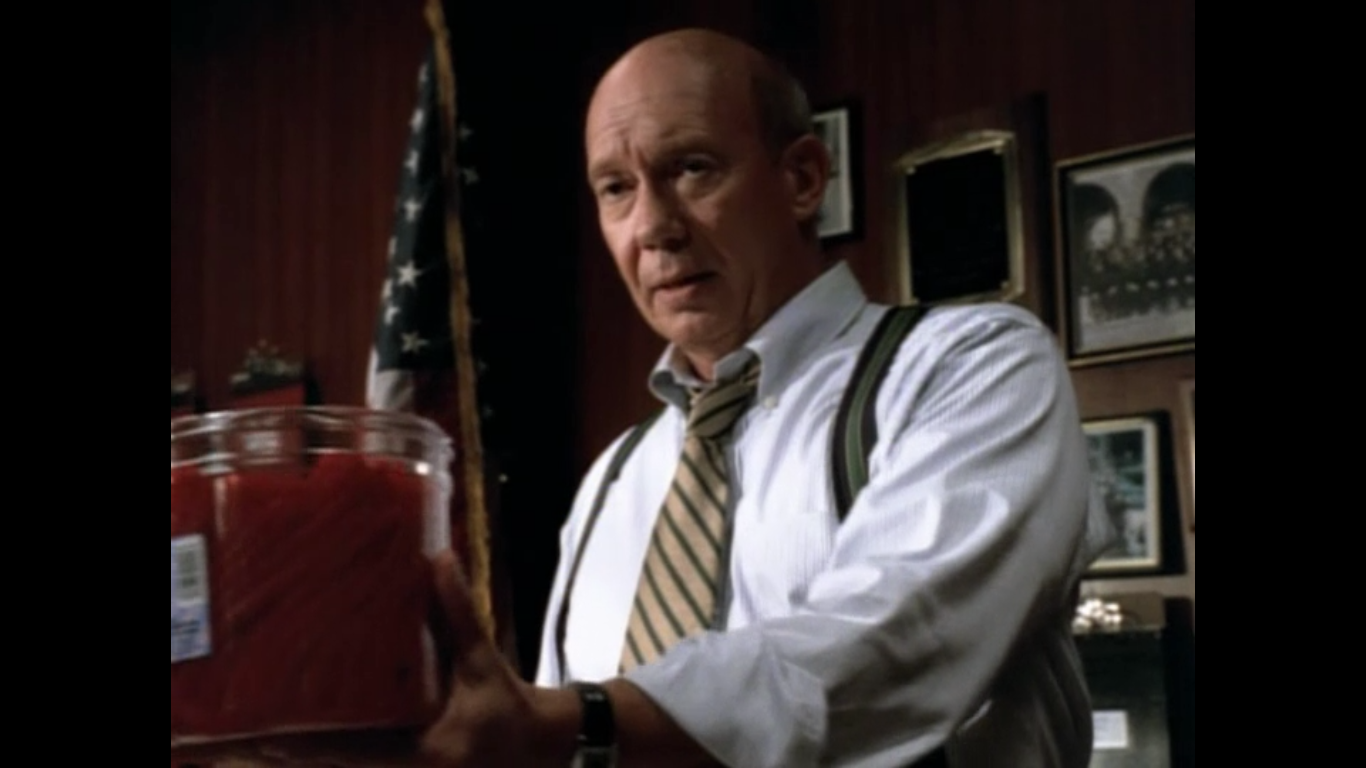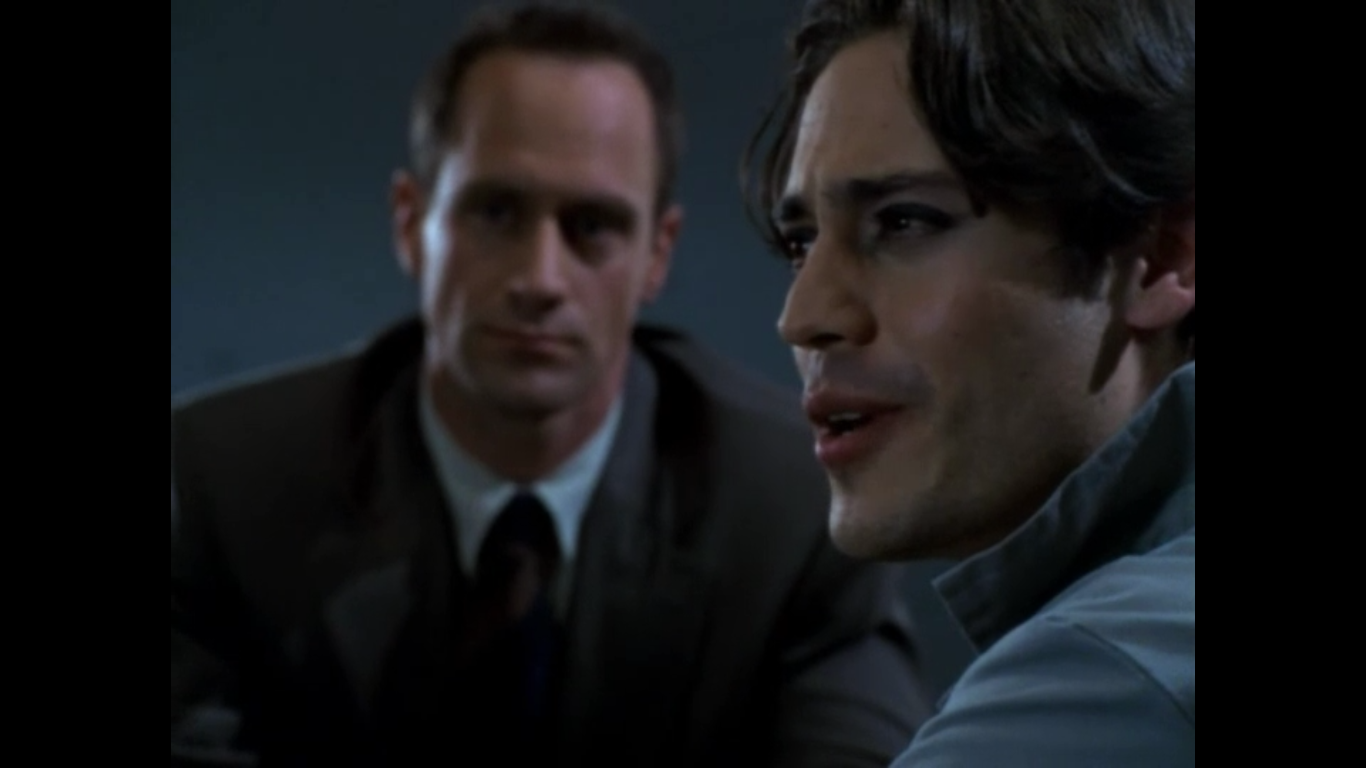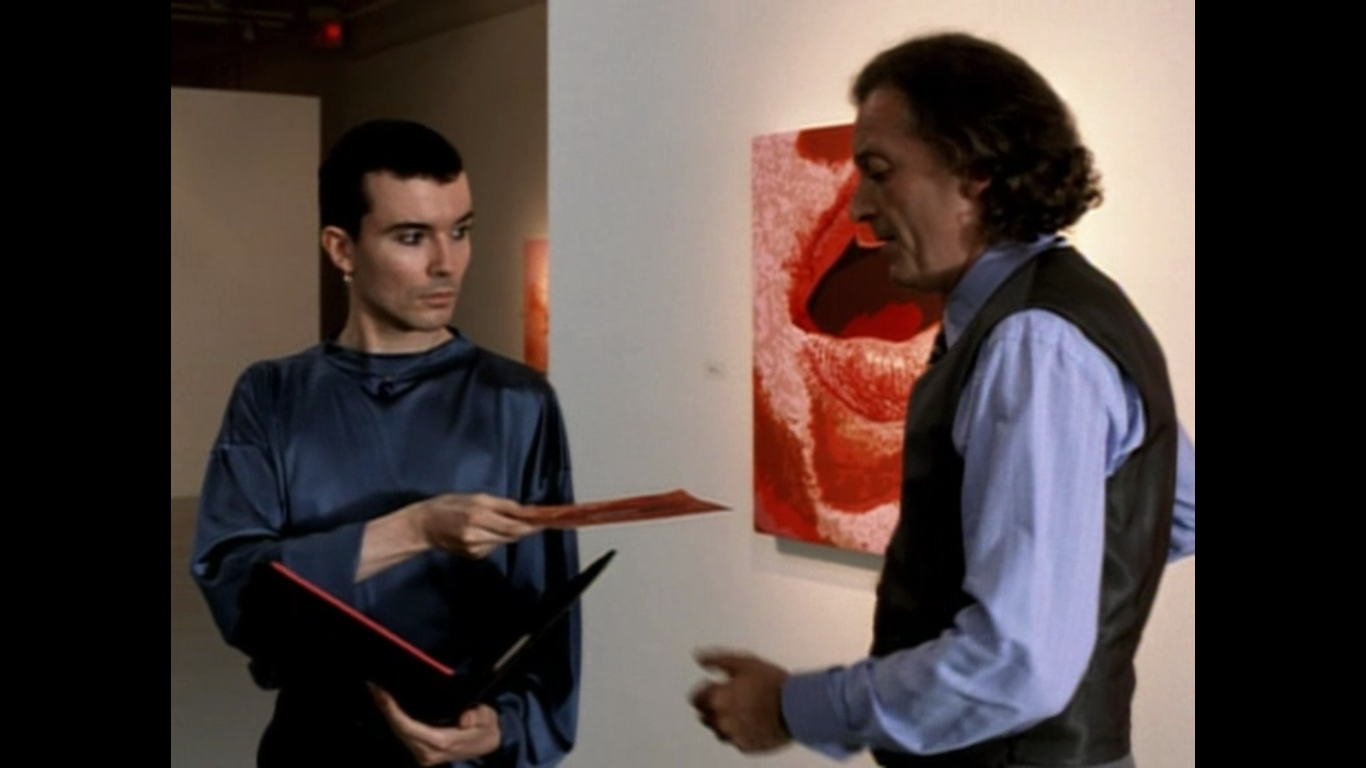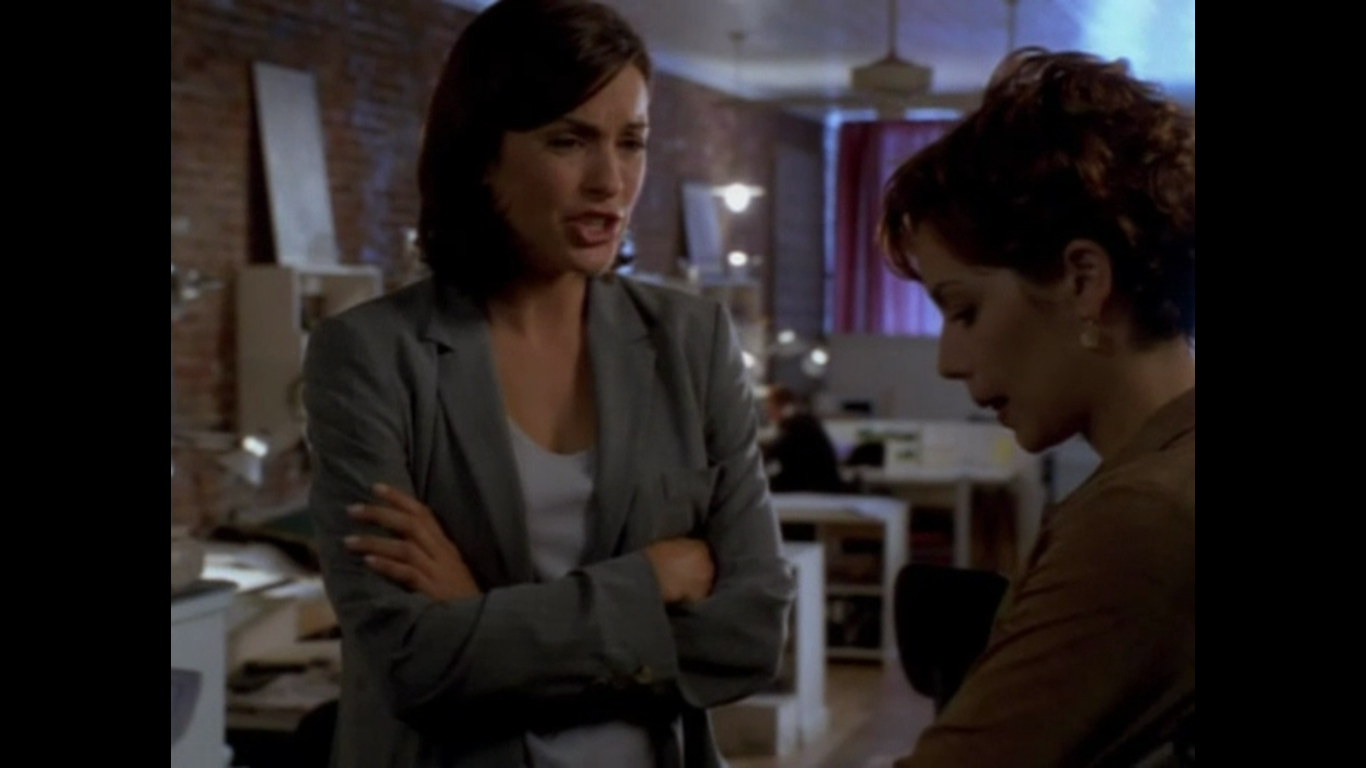
Stabler is next seen in court, testifying against a flasher he arrested in a public park. Since there's no question he had probable cause for the arrest, the defense lawyer is needling him about his position on the SVU. "It's an all-volunteer unit, correct? So . . . why did you volunteer?" He begins to throw out guesses that variously paint Elliott as a predator himself and ridicule him. "Detective Stabler . . . are you obsessed with sex?" "Do you see yourself as the Ken Starr of the NYPD?"
Rather than as Kenneth Starr, Stabler says, he sees himself as "the father of four children, and I don't want them exposed to Mr. Gloucester's shortcomings." Delightfully, this vague insinuation about the defendant's junk is enough to make him flip out and start waving his dick around the courtroom. Guilty as charged!
Next, our detectives find that their victim isn't actually Victor Spicer--he just bought or stole Spicer’s cab license. The real Victor is in Rikers for prostitution, and he's a pretty boy with heavy eyeliner who flirts with Elliott and fulfills every one-dimensional p
 rison bitch stereotype in the book. Before going to jail, he sold his license to an illegal Czech immigrant with a little boy and a pregnant wife, to whom they now have to break the news. "Whoever did it thought they were killing that disco queen in Rikers!" Benson says with distaste.
rison bitch stereotype in the book. Before going to jail, he sold his license to an illegal Czech immigrant with a little boy and a pregnant wife, to whom they now have to break the news. "Whoever did it thought they were killing that disco queen in Rikers!" Benson says with distaste.Stabler thinks she's right, and he's sure the perp is an angry male lover of Spicer's. Then, he learns that a red-polished fingernail was found in the front seat of the guy's cab. Olivia reminds him that the 911 dispatcher thought it was a woman who had called about Stabler. "Could be a he-she," says Stabler as if this is a funny joke. Benson giggles.
The detectives go see a few men recently arrested for soliciting Spicer, now thinking their murderer might be a jealous wife. It's a no-go: one man's wife is a paraplegic and the other's is a lesbian-leaning bisexual who willingly joins him in a beard/purse open marriage. Aided by his mincing assistant, about whom Elliott and Olivia exchange looks, this second man--a weird, foreign gallery owner--gets
 them his wife's information. It's not because she can help with the case, though. "Her name is Clarissa," he says, leering at Olivia, "and you should give her a call."
them his wife's information. It's not because she can help with the case, though. "Her name is Clarissa," he says, leering at Olivia, "and you should give her a call."Later, at the station, Elliott shows the captain the fingerprint check on the victim, who, it turns out, wasn't really Czech but a Serb named Stefan Tanzik who is under indictment for war crimes in Bosnia. The crimes include the rape of 67 women, 5 of whom are alive and in the New York area, says Stabler. The obvious next step is to look at those five women, whose motive for a murder-castration is clear.
"Your partner may not like this," says an uncomfortable Cragan. "Just don't let her forget, we don't get to pick the vic." Sure enough, upon learning that their victim was a rapist, Benson becomes agitated. There's no reason to assume Tanzik's wife knew the whole truth, but when they speak to her again, Benson aggressively verbally harasses her. "How does it feel to sleep with someone who raped dozens of defenseless women?" She yells. "That was about the dumbest move I've ever seen you make," Stabler remarks as they leave the building moments later. We learn that Benson is already on thin ice with the captain, who questions her objectivity. They visit one of Tanzik’s victims, who is blind and scarred as a result of his attack. Olivia cries. "You know that Tom Hanks movie where he manages the girls' team?" Stabler asks her. "There's no crying in baseball."
The second rape victim, Marta, isn't at home, but they meet her husband and young son--the product of her rape by Tanzik. They decide to call it a day. Elliott offers to drop Olivia off, but she says she'll walk home. Instead, she goes to Marta's place of work for an interview.

Marta acts suspiciously and offers an alibi that no one can corroborate, but after she shares the harrowing story of being held captive and raped by Tanzik, a teary Olivia has no more questions and leaves.
Next we see Benson at dinner with her mother. "There's not a doubt in my mind" that Marta killed Tanzik, Benson says, but she doesn't blame Marta. In fact, the story makes her wish she'd been in the cab to see Tanzik get stabbed and chopped herself. Mom, a rape survivor, says that she understands the murder but doesn't condone it, and would not have done the same. This seems to anger Olivia. "Do you think you would have been better off with me in prison the whole time you were growing up?" asks Mama Benson. "I hate him for what he did to you," is Olivia’s only answer. "So do I," Mom says, "and if he hadn't, you would not be here."
The next morning, Benson flat out lies to Stabler: "No, I don't think she murdered him." He's skeptical, but she won't budge.
They go to check out another of Tanzik's victims. She has red fingernails, a bandaged hand, and offers an unconvincing denial of knowing Marta. Benson protests, but Stabler is pretty sure these two ladies are the killers and wants to take them both into custody. Marta cries but comes willingly, Benson giving her some friendly legal advice while Stabler isn’t looking. The restaurant owner threatens Stabler with a knife, then kills herself with it instead.
Marta confesses, describing it as a nonpremeditated crime of passion. The DA asks for a lenient Manslaughter 2 charge, and says Marta will likely get off with a brief stay in a mental hospital, thanks to the extreme emotional distress of her situation. The detectives are fine with that, but Cragen rakes them over the coals for failing to explore the holes in Marta's confession. The murder was clearly premeditated and not Man 2 material, he says. "I think that we did the one thing that's gonna allow me to sleep tonight!" says Olivia unwisely. Cragen stares her down. "You just used your get out of jail free card, Olivia. There's only one in the pack."
A strong pilot in terms of pacing and plot, "Payback" is a mixed bag where rape/sex/gender politics are concerned. In Elliott's courtroom scene, the defense lawyer's ad hominem attack and condescending tone make for an accurate portrayal of dismissive, minimizing attitudes towards sex crimes (especially those other than rape) and the common tendency to unreasonably question the motives of those who want to help (especially men). Survivor Marta's story is realistic for a rape that would have occurred in her situation, and the show treats it sensitively. The rapist's crimes and their depravity are given full due. Even as Tanzik’s victims become his killers, they aren’t demonized--their characterization remains sympathetic, and their actions are portrayed as understandable, if not to be condoned.
Olivia's unprofessional behavior serves two purposes here--one good and one bad. In emotional tone if not in specifics, it rings true. At one time or another, those who advocate for rape survivors all struggle mightily with their desire to see victims receive true justice while abiding by the rules of a legal system in which that's not always possible. This basic conflict is both real and a great source of drama and character development for the show, so I give the writers a wholehearted thumbs up for addressing it. However, Detective Benson blows right past "understanding" Tanzik's murder and not only condones it but lies in order to protect the murderers. Pretty sure that's not okay. Writing Olivia as the angry, conflicted product of a rape herself and a loose cannon who's willing to break the rules is incredibly juicy. I get why the writers went there. However, millions of viewers who may not have ever thought about the issue of justice for rape survivors before just got the message that sex crimes units are populated by emotional women who want to cut men's dicks off. Given the attitudes of people like the defense lawyer at the beginning of this episode, is that really what we need?
This episode's really egregious offense is its portrayal of gays, and one of the most interesting things about the episode is its illustration of how far gays on TV have come in the last decade. Stereotyped, over-the-top flaming gay men we still see all the time, but they're nearly always depicted as lovable or at least amusing. Here, our heroes exchange looks of unabashed disgust and concern over the fabulous art gallery assistant's effete mannerisms. Worse, the episode paints gays as suspicious, likely to be mixed up in sex crimes, and unable to resist hitting on attractive members of their own sex even when it constitutes colossally poor judgment (such as when the person in question is a probably-straight police officer who considers you a person of interest in a murder investigation). Transfolk are a punchline.
Finally, although the story is told with a reasonable degree of nuance and sympathy for the rape victims, the episode is called "Payback." The crime actually being investigated is a case of two angry women castrating a man. It's a little disappointing that the writers found an exotic, sensationalistic story about victim retaliation necessary to introduce a show about sex crimes. There's plenty of drama to be wrung out of a garden-variety rape or domestic violence case affecting people middle-American viewers can relate to, especially the first time you tell it. Why instead tell a story about rape that took place in a land far, far away, under war-torn circumstances most Americans in the 90's couldn't dream of, causing the victims to react with uncommonly brutal violence? This kind of retaliation against rapists is unusual. A rape that took place in an ethnic conflict on the other side of the world ending up in the hands of the NYPD is kinda far-fetched. Nothing necessarily wrong with a fanciful story presented on TV, but there’s already so much mistaken “conventional wisdom” floating around about sexual abuse that a primetime show further reinforcing it seems a little irresponsible. Indeed, “Payback” backs up some of society’s most pervasive rape myths:
-only the worst people in the world, like crazy, racist mass-murderers, commit rape.
-rape mostly happens to disenfranchised women (such as ethnic minorities in developing nations).
-rape always includes obvious violence.
-abuse is a two-way street and victims usually give as good as they get.
-rape always ruins lives.
Still, "Payback" is far from the worst offender in the SVU canon and, as discussed above, also has a few good things going for it. We’ll give it a B minus? C plus?
Screencaps by Micol Ostow, http://micolostow.wordpress.com. Thanks Micol!